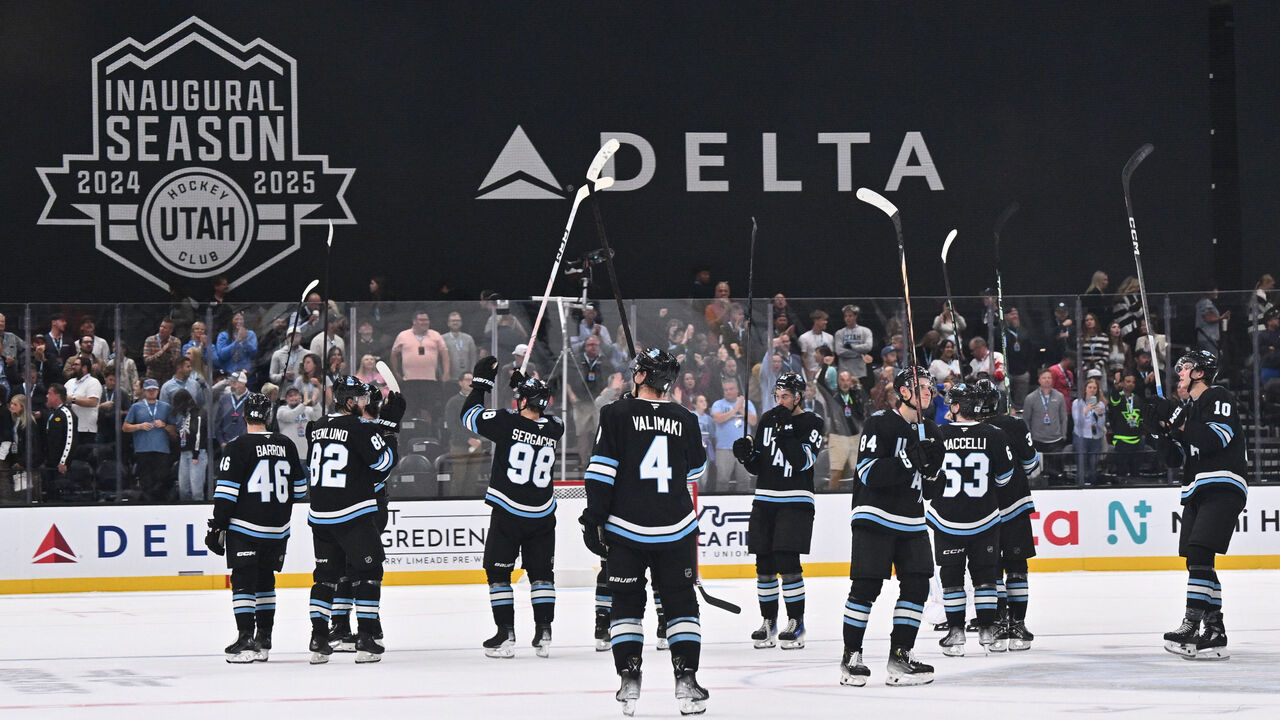Utah welcome exposes Bettman's truculence about hockey in Arizona
The stories out of Salt Lake City this week as the Utah Hockey Club played its first preseason game on home ice carried all the hallmarks of an expansion franchise.
There were attendees who had last seen professional hockey in Utah as children decades ago when the minor-league Golden Eagles still played in the state capital. There were explanations for the voracious demand for tickets, with the whole of the Delta Center's 11,000 or so unobstructed seats already sold out for the upcoming season. Fans enthusiastically thanked team owner Ryan Smith for bringing the NHL to their city. Everyone was just thrilled.
But this, of course, wasn't an expansion. The NHL is only in Utah because it finally decided to get out of Arizona. It did so with such haste, scrambling into the arms of Smith and, more importantly, away from former Coyotes owner Alex Meruelo and the latest of his speculative arena plans, that the Utah team doesn't have a brand or nickname yet. The Delta Center is also a couple of years away from being properly renovated for hockey.
And so, as the NHL basks in the glow of a gleeful new market, it's worth asking: What took them so long? And amid persistent rumors that the league plans to expand again, it's also worth asking: Did it learn any lessons in Arizona?
NHL commissioner Gary Bettman spent decades insisting that the foray into the Arizona desert would eventually come good.
Bettman never quite wanted to acknowledge that desert hockey just wasn't working, even when all the evidence pointed in that direction. But in retrospect, the number of ways he avoided admitting this fact is staggering.
Shortly after the team arrived in Phoenix in 1996, new arena plans fell through, as did another plan to move the team to nearby Scottsdale. The club eventually landed on suburban Glendale, in what was probably the most spectacularly ill-suited marriage of site and team outside the Canadian Football League's move into the southern United States. The owner bailed a few years later, and another owner had no more success making a go of it. By this point, the Coyotes were a distressed asset, and the team filed for bankruptcy in 2009. It briefly seemed headed for Hamilton, Ontario, an hour west of Toronto, before the NHL and the courts put an end to that.
Still, Bettman didn't relent. The NHL bought the club and owned it for a four-year period that included a series of failed takeover bids. By 2013, the franchise finally had permanent private owners, and two years later, Glendale's city council voted to cancel the team's lease because the Coyotes had become such an anchor on municipal finances.

Readers will note that by that point, there had been several instances in which the NHL could have reasonably said it gave Arizona an honest try. And yet they kept at it for almost another decade with yet another owner, more failed arena plans, and the eventual bizarre stop-gap solution that saw them play in a college hockey arena with fewer than 5,000 seats.
Finally, Bettman could bear it no longer. More accurately, he couldn't pretend that Arizona State University's Mullett Arena was a viable home for an NHL franchise once it became clear there was no end date on the team's time there. Maybe Meruelo would eventually figure out where to build a new, full-size arena and pay for it somehow. Probably he wouldn't. So, the Utah Hockey Club was born because Smith had a billion dollars to offer and a quasi-suitable arena. Done and done.
Why didn't the league do this 10 or 20 years ago? Hard to say. Stubbornness? Loyalty? Annoyance at the persistent narrative from Canadian fans and media that Bettman had made a mistake with his Sun Belt expansion?
Whatever the reasons, it's notable that the subject of NHL expansion has picked up again, with Houston and Atlanta, a twice-failed franchise home, mentioned as leading contenders. Yes, both places are right there in the American South, where teams have repeatedly struggled. But the league has recently been on a hot streak with good crowds in Vegas, Florida, and Carolina.
Is the NHL really going to expand back into the South after finally, belatedly, solving its long-running desert problem? Does it want to make such a high-risk move again?
For what it's worth, Bettman shot down the expansion talk when asked this week, saying that reports of a looming plan to add teams had "no basis in fact." But he's not the most reliable of narrators.
This is the same guy who kept saying that he was certain NHL hockey in Arizona was bound to be a hit.
Scott Stinson is a contributing writer for theScore.